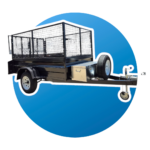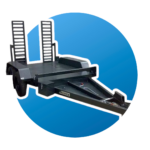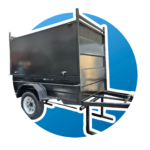Trailers are integral to many sectors, from agriculture and landscaping to construction and logistics. Whether hauling equipment, transporting goods, or running a trade-based business, investing in the right trailer can improve efficiency, safety, and return on investment. However, selecting a trailer manufacturer is essential in getting the desired performance from your truck
Here’s everything you need to know about a trailer manufacturer before purchasing.
Table of Contents
ToggleSelecting a Trailer Manufacturer
By choosing a qualified trailer manufacturer, you can save money, time, and hassle. Here are the factors to consider while choosing a trailer manufacturer.
Understanding Your Trailer Use Case
Before exploring manufacturers, it’s important to identify your specific trailer use case. Different industries and businesses require different trailer types, and knowing your primary application will help you make the right choice.
Common use cases include:
- Construction & Earthworks: Plant trailers or tipper trailers that carry heavy equipment.
- Trade Professionals: Tradesman trailers with custom compartments and toolboxes.
- Landscaping: Tandem axle trailers transport green waste and machinery.
- Vehicle Transport: Car and motorcycle trailers designed with ramps and secure anchor points.
- Agriculture: Flatbeds and utility trailers to move produce, livestock feed, and equipment.
Assessing the Manufacturer’s Industry Experience
An experienced manufacturer brings deep knowledge of how to design trailers that:
- Meet local road safety standards
- Perform under harsh conditions
- Remain durable for years to come
Choose a company that has been in business for a significant period and has established a track record. Australian-made trailers are typically built to suit local terrain and climate, making them compliant with regional transport laws. Check whether the manufacturer has worked with clients in your industry to ensure they understand specific needs related to your trailer use case.
Reviewing the Load Capacity Guide
To make the best buy, it is essential to know the load capacity. When a trailer is overloaded, it may cause:
- Mechanical failure
- Road hazards
- Breaches of road transport regulations
Reputable manufacturers will specify each model’s Gross Vehicle Mass (GVM) and payload capacity. It’s essential that these figures align with your hauling needs and that the manufacturer follows Australian Design Rules (ADR).
Trailer Material Quality
The trailer material quality largely determines the durability and performance of any truck. High-quality components can prevent rust, withstand regular wear and tear, and significantly increase the trailer’s lifespan.
Galvanised or Zinc-Coated Steel: Excellent corrosion resistance, especially in coastal or high-humidity areas.
- Galvanised or Zinc-Coated Steel: Excellent corrosion resistance, especially in coastal or high-humidity areas.
- Reinforced Chassis and Frame: Provides improved structural integrity when supporting heavy loads.
- Premium Axles and Suspension: Ensures smoother transport and longer-lasting performance.
- Durable Flooring Options: Checker plate steel or marine-grade plywood for impact and weather resistance.
Before selecting a trailer manufacturer, ask for specifications about the materials used and whether they comply with Australian standards.
Product Range and Customisation Options
The best trailer manufacturers offer more than a standard lineup. They provide a wide product range and customisation options.
Look for manufacturers that provide:
- Different kinds of trailers, including tradesman builds, plant trailers, and tippers.
- Personalised construction for special measurements, sections, or add-ons.
- Optional add-ons like ramps, spare wheel mounts, ladder racks, or mesh cages.
Customisation ensures the trailer suits your trailer use case and reflects the manufacturer’s flexibility and attention to detail.
Safety Standards and Compliance
Manufacturers should ensure their products are ADR-compliant and undergo rigorous quality control before leaving the factory.
Check for:
- Electrical wiring that meets lighting regulations
- Braking systems certified for the trailer’s weight class
- Proper reflectors and visibility enhancements
- Chassis stamped or labelled with compliance plates
Request to see documentation or inspection certificates where applicable.
Customer Support and After-Sales Service
A well-established company will have efficient quoting processes, clear communication, and after-sales services that add value.
Some support elements to look for include:
- Structural warranties (e.g., 3 to 5 years)
- Spare parts availability
- Servicing or repair recommendations
- Fast delivery or pickup options
Responsive customer service is a strong indicator of long-term reliability.
Reputation and Client Feedback
Finally, take the time to research the manufacturer’s reputation. Word-of-mouth recommendations, online reviews, and testimonials may provide genuine information on trailer performance and client satisfaction.
Why Choose Great Western Trailers for Your Trailer Needs
With over 35 years of hands-on experience, Great Western Trailers is a trusted name in custom trailer manufacturing. From standard box trailers to specialised plant and machinery trailers, we build durable, high-quality trailers designed to suit a wide range of needs. Our team takes pride in delivering strong workmanship backed by a 12-month warranty on all parts and labour.
Need your trailer registered? We can organise that on the spot. Already have a trailer? We also offer repairs, refurbishments, and custom upgrades to keep your equipment in shape. When selecting a trailer manufacturer, it’s essential to consider your trailer use case, the load capacity guide, and the trailer material quality, and that’s where we stand out. Every trailer we build is made to match your exact needs and built tough to handle Australian conditions.
Contact us today to start with a trailer built to perform, built to last, and just for you.







